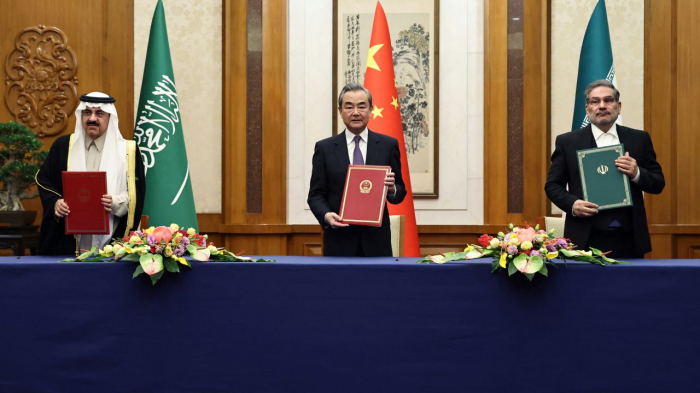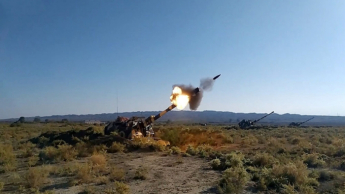Why did China reconcile Iran and Saudi Arabia? - INTERVIEW

Baku Tribune presents an interview with irish historian Patrick Walsh.
- China reconciled Saudi Arabia and Iran. Why was Beijing interested in this? Why did China need this?
- This was a triumph for Chinese diplomacy and must be seen as a serious moral blow against the US. Beijing is determined to show it is no pushover for Washington. China has intruded into a region that was never seen as anything but the preserve of the US and managed to bring two bitter enemies together in the mutual interest. Washington has, since 1979, been promoting conflict between the Saudis and Iran. China has managed to nullify this antagonism. Geopolitically this is about securing stability in an important region for the westward development of Eurasia, which Beijing has a keen interest in.
- In your opinion, under what conditions did China manage to achieve reconciliation between these countries? What did Beijing promise both countries in exchange for the normalization of bilateral relations?
- All 3 Powers have an interest in a changing global order, shifting from the unipolar world presided over by the United States to a multipolar world in which regional powers do business, without Western interference, in the mutual interest. A key part of the agreement emphasised “respect for the sovereignty of states and non-interference in internal affairs of states”. This will reduce the chances of regional conflict and tensions. The Iranian threat to Saudi oil production and Saudi counter-threat to Iran will be nullified, perhaps bringing an end to the series of proxy wars fought between the two countries that diverted energies away from stability and economic development. Relations will be returned to what they were between 1997 and 2005.
- Do you think the US has finally lost influence in Saudi Arabia?
- The US has not lost all influence with the Saudis but it is certainly in decline. This has come about for a number of reasons. Firstly, the increasing US rhetoric against “authoritarian states” has actually given the states that do not measure up to Washington’s “democratic credentials” a reason to band together for protection. Both Saudi Arabian and Iranian governments would have to be overthrown in revolutions to satisfy Washington these days so why try to appease the US now? Biden’s America will never give Saudi Arabia unconditional support today against Iran. Secondly, the Saudis, who saw the US as their only viable partner in the days of George W. Bush, now see that the period of the US as the sole unchallenged superpower is over. It is time to settle accounts with neighbours with whom they live, rather than a Power that will have its hands full in fighting wars or proxy wars with Russia and China. I think it was a worry in Saudi Arabia that the US might do a nuclear deal with Iran and an energy deal to replace Russian oil and gas in Europe. That looks unlikely now but the Saudis saw it as indicative of Washington’s unreliability in a situation where it was cast in the same camp as Iran in America’s rhetoric.
- Relations between Iran and Saudi Arabia promise to be stable? Or will the normalization of relations be temporary?
- This is a difficult question since there are still opportunities for conflict over Yemen, in particular, and also Iraq. However, the Syrian situation seems to be calming and Lebanon has economic problems rather than communal conflict at present. So there is an opportunity to establish the stable relations between the great Sunni and Shia states that could produce a framework for an amelioration of religious/political conflict in these spheres. Certainly, both Saudi Arabia and Iran have an interest in stability for economic and internal political reasons.
- In your opinion, why is the United States, together with its allies, in no hurry to overthrow the regime of the mullahs in Iran? US in a wait-and-see position, waiting for the right moment?
- I think that although the US has been in conflict with Iran since 1979 it has no plans to engage directly in conflict with Tehran. The US aims to undermine the Iranian government through promoting division and conflict within the country, mainly through democracy promotion and rights agitation. What it is primarily worried about is the Iranian potential at acquiring the ability to build a nuclear deterrent. This is not only because an Iranian nuclear power is unacceptable for the US but because of the action Israel may take to prevent it. Washington is fearful of this turning the entire region into a battleground with a consequent threat to energy supplies and oil prices. Iran is, at present, far down the list of Washington priorities. China is the priority for the US after a resolution of the Ukraine/Russia conflict. There is a feeling in Washington now that the Middle East was a diversion for the US between 1990 and 2020, when the forever wars in Iraq and Syria, along with Afghanistan, consumed American attention and resources, allowing Putin to resurrect Russia and China to grow into the economic giant it has become. I expect Washington would prefer a holding operation against Iran, containing it rather than making any direct attempt to overthrow the regime.
The Rocket and Artillery formations of the Azerbaijan Army conduct live-fire exercises in accordance with the combat training plan for 2021, the Ministry of Defense of Azerbaijan told Baku Tribune.
LAST NEWS






.jpg&h=67&w=67&zc=1&q=100)













